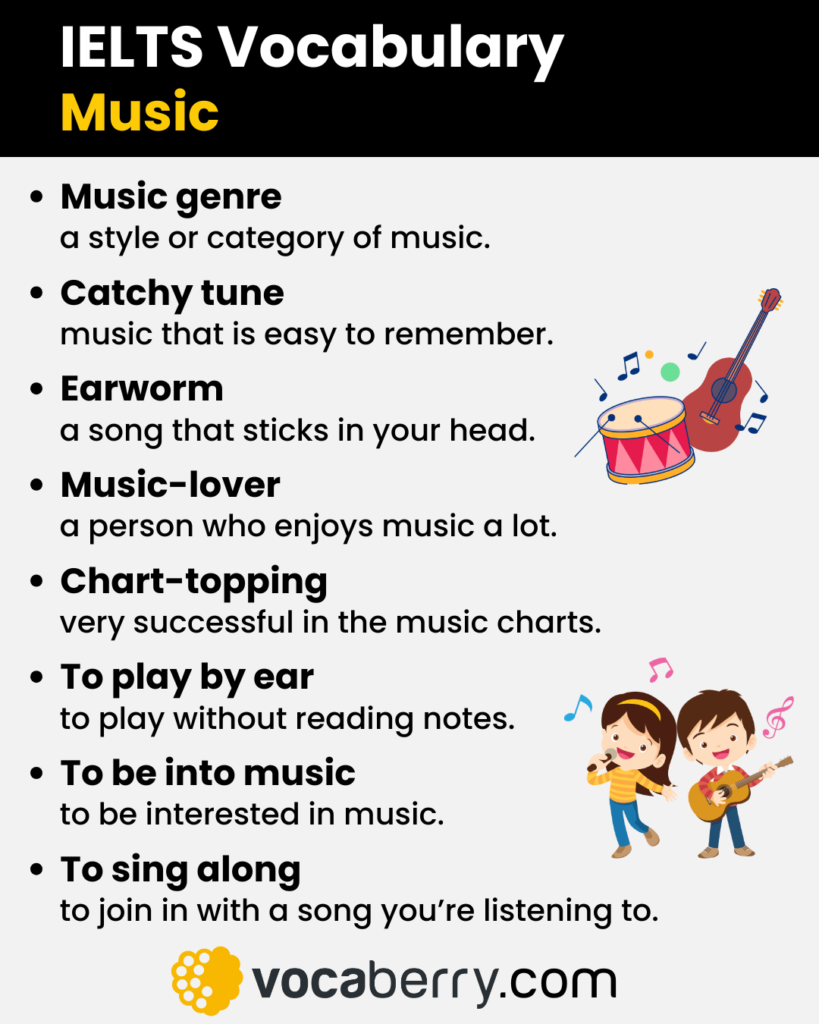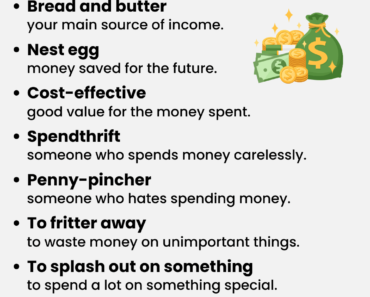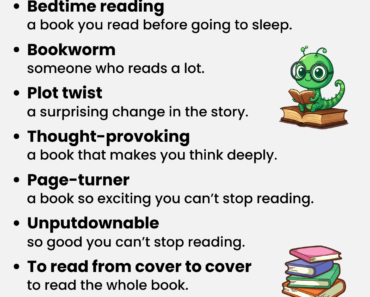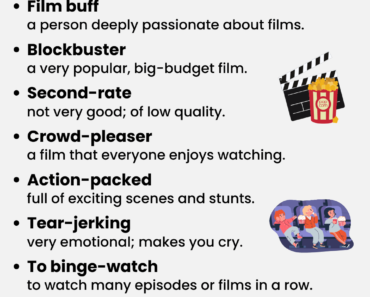
Music is another popular topic in the IELTS Speaking test. Examiners may ask you about your favorite type of music, whether you play an instrument, or how music affects people’s lives. In this guide, you’ll find useful IELTS vocabulary for music with clear definitions, followed by IELTS Speaking Part 1, Part 2, and Part 3 questions with sample answers.
IELTS Vocabulary for Music
Here is some useful IELTS vocabulary for talking about music with clear definitions. These words and phrases will help you give better answers in the IELTS Speaking test.
- Music genre – a style or category of music.
- Catchy tune – music that is easy to remember.
- Music-lover – a person who enjoys music a lot.
- Lyrics – the words of a song.
- Melody – the main musical line of a song.
- Chorus – the part of a song that repeats.
- Soundtrack – music in a film or show.
- Background music – music played softly while doing something else.
- Country music – American folk-style music with guitars and storytelling.
- Live performance – music played in front of an audience.
- Concert / gig – an event where musicians play live.
- Festival – a large outdoor music event.
- Encore – an extra song at the end of a concert.
- Musician / band – a person or group who makes music.
- Vocalist – the singer in a band.
- Classical music – traditional orchestral music.
- Pop – modern, mainstream music with catchy melodies.
- Rock music – energetic music with electric guitars and drums.
- Heavy metal – loud, aggressive rock music with strong beats.
- Metalhead – a fan of heavy metal music.
- Rap – rhythmic spoken lyrics over a beat.
- Jazz – music with improvisation and complex rhythms.
- Reggae – relaxed Caribbean music with offbeat rhythm.
- Blues – soulful music often about sadness or struggle.
- Traditional music – folk or cultural music from a region.
- Easy listening – soft background music.
- Instrumental music – music without lyrics.
- Ballad – a slow, emotional song.
- Hit single – a very popular song.
- Chart-topping – very successful in the music charts.
- Music streaming – listening to music online.
- Playlist – a collection of chosen songs.
- Earworm – a song that sticks in your head.
- Danceable – easy to dance to.
- Soothing music – calming and relaxing music.
- Upbeat music – positive, energetic music.
- Elevator music – soft background music in shops or lifts.
- Uplifting – music that makes you feel positive.
- Nursery rhyme – simple children’s song or poem.
- Emotional connection – a strong personal feeling about music.
- Universal language – music understood by everyone.
- Acoustic music – music played without electronic amplification.
- Amplified sound – music made louder with electronic equipment.
- Virtuoso – a highly skilled musician.
- Improvisation – creating music on the spot without preparation.
- Fusion – a mix of different music styles.
- Harmonise – to sing or play notes that sound good together.
- Pitch – how high or low a sound is.
- Tempo – the speed of the music.
- Rhythm – the beat or pattern of sounds in music.
- Dynamics – variations between loud and soft in a piece.
- A sell-out concert – a concert with all tickets sold.
- A piece of music – one complete musical work.
- Adoring fans – very devoted supporters.
- A sing-song – informal group singing.
- A massive hit – a very successful song.
- Composer – a person who writes music.
- Audience engagement – how much the crowd responds to the performance.
- Standing ovation – when the audience stands up and claps.
- Stage presence – the energy or charisma a performer shows on stage.
- Backing vocals – supporting singers in the background.
- Recording studio – a place where music is professionally recorded.
- Streaming platform – services like Spotify or Apple Music.
- Crossover genre – when artists mix styles, like pop and classical.
- Cultural identity in music – how music reflects traditions or heritage.
- Therapeutic effect of music – using music for stress relief or healing.
- Timeless classic – a song that remains popular across generations.
- String instrument – instrument with strings, like violin or guitar.
- Taste in music – the kind of music you like.
- To be into music – to be interested in music.
- To sing along – to join in with a song you’re listening to.
- To take up a musical instrument – to start learning an instrument.
- To read music – to understand written musical notes.
- To play by ear – to play without reading notes.
- To be musical – to have natural musical ability.
- To have a good ear – to recognise notes or tunes well.
- To have a great voice – to sing very well.
- To be out of tune – to play or sing off pitch.
- To be in tune – to play or sing correctly.
- To be tone deaf – unable to hear musical notes correctly.
- To download tracks – to get music from the internet.
- To go on tour – when artists perform in many cities.
IELTS Speaking: Music Questions & Answers
In this section, you’ll find IELTS Speaking Part 1, Part 2, and Part 3 questions on music with sample answers. These examples show how the music vocabulary can be used in your responses during the test.
IELTS Speaking Part 1 – Music
Do you like listening to music?
Yes, absolutely. I’m a real music-lover, and I listen every single day. Sometimes I play easy listening or soothing music in the background when I study, and other times I go for more upbeat music like pop or rock to keep my energy up.
What type of music do you usually listen to?
It depends on my mood. When I want to relax, I put on some jazz or blues because the melody and rhythm feel calming. But if I’m exercising, I prefer chart-topping songs with a strong beat that are more danceable.
Did you learn to play any musical instruments as a child?
Yes, I took up a musical instrument when I was in school, I learned the piano. At first I struggled to read music, but after some time I managed to play by ear. That’s when I realised I was quite musical, and it really improved my confidence.
Do you prefer live music or recorded music?
I prefer a live performance because the atmosphere is so special. Seeing a band or vocalist on stage with great stage presence is unforgettable. Sometimes the crowd even asks for an encore, and the energy from the adoring fans makes the whole concert amazing.
How often do you listen to music?
Pretty much every day. Thanks to music streaming and downloaded tracks, it’s so easy to carry a whole playlist on my phone. Even short journeys feel better with a catchy tune or a timeless classic to sing along to.
IELTS Speaking Part 2 – Music Cue Card
Describe a live music performance you have enjoyed.
You should say:
- what kind of music it was
- where it took place
- who was performing
- and explain why you enjoyed it.
Sample Answer:
One of the most unforgettable experiences I’ve had was going to see a rock band perform live last summer. They were quite popular in my country because they had recently released a chart-topping hit single, and I was lucky enough to get a ticket before the concert became a complete sellout.
The concert took place in a huge outdoor festival venue, and the atmosphere was just electric. From the moment the band stepped on stage, the adoring fans started cheering and singing along to every word. The vocalist had such a powerful voice and amazing stage presence that he completely captivated the crowd. You could feel the rhythm of the drums and the riffs from the string instruments vibrating through the ground, and the sound was so perfectly amplified that it felt like being inside the music itself.
What made it even more special was the way the band interacted with the audience. At one point they played a slower ballad, and everyone in the crowd turned on their phone lights, which created a magical atmosphere. Later, when they performed their most famous track, it turned into a kind of sing-song, with thousands of people joining in. The connection between the performers and the audience was so strong that when they finished, the crowd demanded an encore, and of course the band came back on stage to play one more massive hit.
For me, this concert wasn’t just entertainment, it was a real emotional connection. It reminded me that music is a kind of universal language because even though the crowd came from different backgrounds, we were all united in that moment by the same piece of music. I left the venue feeling completely uplifted, and I still think about it whenever I hear their songs on my playlist or on a streaming platform.
That’s why I would say it was one of the best musical experiences of my life, and it showed me how powerful live music can be compared to just listening to a recording.
IELTS Speaking Part 3 – Music Discussion
IELTS Speaking Part 3 questions about music often ask you to compare traditional and modern music, discuss the importance of music in education and culture, and give opinions on issues such as the music industry, technology in music, and the role of music in society.
How has technology changed the way people listen to music?
Technology has completely transformed how we experience music. In the past, people had to buy CDs or tapes, but now, thanks to streaming platforms, you can access almost any music genre instantly. People can create a personal playlist, download tracks, and discover new songs through recommendations. The convenience means people listen to music far more often, whether commuting, studying, or exercising. I think it has allowed people to explore a wider variety of music than ever before.
Do you think traditional music is still important in today’s world?
Yes, I believe traditional music remains very important. Even though many young people enjoy pop or rock music, traditional folk songs often carry stories from the past and preserve cultural identity. For me, this kind of music is like a timeless classic because it represents heritage and belonging. At cultural festivals in my country, traditional live performances still attract large crowds, showing that people feel a strong emotional connection to their roots.
What role does music play in people’s daily lives?
Music plays several roles in daily life. For entertainment, people enjoy upbeat music at parties or dance to chart-topping tracks. For relaxation, others listen to soothing music or easy listening when they feel stressed. Music can also be educational; children who take up a musical instrument learn to read music and develop a good ear for rhythm. On a social level, music brings people together, whether it’s adoring fans at a concert or friends having a casual sing-song.
Should schools encourage students to learn musical instruments?
I strongly think schools should encourage it. Learning a string instrument or the piano teaches patience because students need to practice regularly and stay in tune. Some may even discover they are naturally musical. Of course, not everyone will become a professional, but being able to play by ear or perform a simple piece of music can give students confidence and a creative outlet. Schools that promote music often produce more well-rounded individuals.
How can music bring people together?
I think music is often described as a universal language, and I completely agree. At a live performance, strangers can all sing along to the same hit single, and everyone feels united. Even across cultures, people who do not share a language can enjoy the same melody or rhythm. Online, cover versions and remixes also bring fans together globally. This shared experience is what makes music so powerful in connecting people.
More IELTS Vocabulary Topics
If you found this lesson useful, explore other IELTS Speaking topics to expand your vocabulary and practice with sample answers:
- IELTS Vocabulary: Accommodation
- IELTS Vocabulary: Advertisement
- IELTS Vocabulary: Animals
- IELTS Vocabulary: Art
- IELTS Vocabulary: Artificial Intelligence
- IELTS Vocabulary: Books
- IELTS Vocabulary: Childhood
- IELTS Vocabulary: Crime and Punishment
- IELTS Vocabulary: Culture and Traditions
- IELTS Vocabulary: Daily Routine
- IELTS Vocabulary: Education
- IELTS Vocabulary: Environment
- IELTS Vocabulary: Family
- IELTS Vocabulary: Fashion and Clothes
- IELTS Vocabulary: Films
- IELTS Vocabulary: Food & Diet
- IELTS Vocabulary: Friends
- IELTS Vocabulary: Gifts
- IELTS Vocabulary: Health
- IELTS Vocabulary: Hobbies
- IELTS Vocabulary: Hometown
- IELTS Vocabulary: Money
- IELTS Vocabulary: Museums
- IELTS Vocabulary: Plants
- IELTS Vocabulary: Shopping
- IELTS Vocabulary: Social Media
- IELTS Vocabulary: Sports
- IELTS Vocabulary: Technology
- IELTS Vocabulary: Transport
- IELTS Vocabulary: Travel
- IELTS Vocabulary: Weather
- IELTS Vocabulary: Work & Jobs






